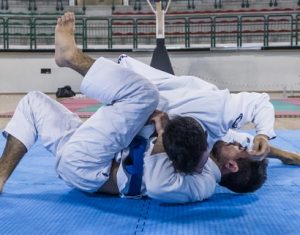 USADA announced today that five athletes have accepted three-year sanctions for their respective anti-doping rules violations, all of which occurred as a result of testing and intelligence from the International Brazilian Jiu-Jitsu Federation (IBJJF) World No-Gi Championship event in December 2022.
USADA announced today that five athletes have accepted three-year sanctions for their respective anti-doping rules violations, all of which occurred as a result of testing and intelligence from the International Brazilian Jiu-Jitsu Federation (IBJJF) World No-Gi Championship event in December 2022.
“All athletes deserve a level playing field so that hard work and talent alone determine the outcome of a competition,” said USADA CEO Travis T. Tygart. “Testing programs help ensure that those who choose to use powerful performance-enhancing substances or otherwise cheat to gain an advantage are held accountable.”
Although the IBJJF is not a signatory to the World Anti-Doping Code, USADA was contracted by IBJJF to conduct testing and results management program for the event, which also includes post-event out-of-competition testing, and IBJJF has agreed to impose the below sanctions.
The athletes, their respective anti-doping rule violations, and the resulting sanctions are identified below. The violations are all prohibited under the World Anti-Doping Code and the USADA Protocol for Olympic and Paralympic Movement Testing, which applied with slight modifications, to the 2022 IBJJF World No-Gi Championships.
- Igor Nascimento da Costa Feliz, 24, of Port San Lucie, Fla., tested positive for exogenous testosterone and its metabolites as the result of an in-competition urine sample collected on December 11, 2022, at the World No-Gi Championships. He accepted a three-year period of ineligibility that began on January 24, 2023, the date he was provisionally suspended from competition.
- Jonnatas Gracie Araujo da Silva, 25, of San Diego, Calif., tested positive for 19-norandrosterone (19-NA), a metabolite of nandrolone and other prohibited 19-norsteroids, and exogenous testosterone and its metabolites as the result of an in-competition urine sample collected on December 11, 2022, at the World No-Gi Championships. He accepted a three-year period of ineligibility that began on January 25, 2023, the date he was provisionally suspended from competition.
- Roberto de Abreu Filho, 42, of Miami, Fla., tested positive for exogenous testosterone and its metabolites as the result of an out-of-competition urine sample collected on December 20, 2022. He accepted a three-year period of ineligibility that began on January 27, 2023, the date he was provisionally suspended from competition.
- José Henrique Cardoso, 29, of Santa Catarina, Brazil, tested positive for 19-NA, 2a-methyl-5a-androstan-3a-ol-17-one (a drostanolone metabolite), epitrenbolone (a trenbolone metabolite), methasterone, and exogenous testosterone and its metabolites as the result of an out-of-competition urine sample collected on January 24, 2023. He accepted a three-year period of ineligibility that began on February 1, 2023, the date he was provisionally suspended from competition.
- Vagner S. Rocha, 40, of Davie, Fla., refused to submit to sample collection after being notified by a USADA doping control officer during an out-of-competition test on December 23, 2022. He accepted a three-year period of ineligibility that began on January 11, 2023, the date he was provisionally suspended from competition.
The samples of the athletes who tested positive for an anabolic agent were analyzed using a specialized test known as Isotope Ratio Mass Spectrometry (IRMS), which is capable of measuring the carbon isotope ratio of urinary steroids, such as testosterone and its metabolites, and confirming their synthetic origin. IRMS is a powerful tool that unequivocally differentiates between anabolic androgenic steroids (AAS) naturally produced by the body and AAS of synthetic origin. Anabolic agents have powerful performance-enhancing capabilities and can give an athlete an unfair advantage over fellow competitors. IRMS testing confirmed that the anabolic agents detected in the athletes’ samples were of external origin.
Under Article 10.8.1 of the Code, an athlete who faces an anti-doping rule violation that carries a period of ineligibility of four or more years may receive a one-year sanction reduction if the athlete admits the violation and accepts the asserted sanction within 20 days of notification of the alleged anti-doping rule violation charge. Per the rule, all five athletes qualified for a one-year reduction to the otherwise applicable four-year period of ineligibility.
In addition, all the athletes have been disqualified from competitive results achieved in competitions sanctioned by the IBJJF, or any Code signatory, on and subsequent to December 11, 2022, the date the 2022 IBJJF World No-Gi Championships started.
In an effort to aid athletes, as well as support team members such as parents and coaches, in understanding the rules applicable to them, USADA provides comprehensive instruction on its website on the testing process and prohibited substances, how to file and update athlete Whereabouts, how to obtain permission to use a necessary medication, and the risks and dangers of taking supplements, as well as performance-enhancing and recreational drugs.
In addition, USADA manages a drug reference hotline, Global Drug Reference Online (www.GlobalDRO.com), conducts educational sessions with National Governing Bodies and their athletes, and distributes a multitude of educational materials, such as a supplement guide, a nutrition guide, a clean sport handbook, and periodic alerts and advisories.
USADA makes available a number of ways to report the abuse of performance-enhancing drugs in sport in an effort to protect clean athletes and promote clean competition. Any tip can be reported using the USADA Play Clean Tip Center, by text at 87232 (“USADA”), by email at playclean@USADA.org, by phone at 1-877-Play Clean (1-877-752-9253) or by mail.
USADA is responsible for the testing and results management process for athletes in the U.S. Olympic and Paralympic Movement and is equally dedicated to preserving the integrity of sport through research initiatives and educational programs.
For more information or media inquiries, click here.



